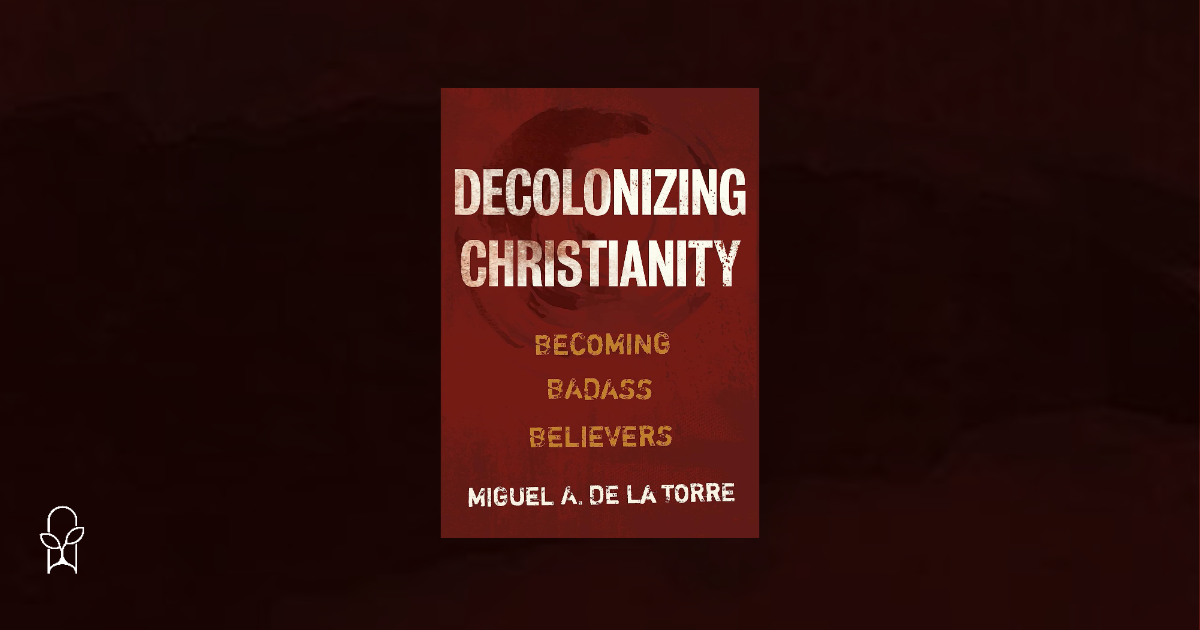
Also by this author: Burying White Privilege: Resurrecting a Badass Christianity, Resisting Apartheid America: Living the Badass Gospel
Published by Eerdmans on March 30, 2021
Genres: Non-Fiction, Racial Reconciliation
Buy on Amazon
Goodreads

“How curiously different is this white God from the one preached by Jesus who understood faithfulness by how we treat the hungry and thirsty, the naked and alien, the incarcerated and infirm. This white God of empire may be appropriate for global conquerors who benefit from all that has been stolen and through the labor of all those defined as inferior; but such a deity can never be the God of the conquered.”
Echoing James Cone’s 1970 assertion that white Christianity is a satanic heresy, Miguel De La Torre argues that whiteness has desecrated the message of Jesus. In a scathing indictment, he describes how white American Christians have aligned themselves with the oppressors who subjugate the “least of these”—those who have been systemically marginalized because of their race, ethnicity, and socioeconomic status—and, in overwhelming numbers, elected and supported an antichrist as president who has brought the bigotry ingrained in American society out into the open.
With this follow-up to his earlier Burying White Privilege, De La Torre prophetically outlines how we need to decolonize Christianity and reclaim its revolutionary, badass message. Timid white liberalism is not the answer for De La Torre—only another form of complicity. Working from the parable of the sheep and the goats in the Gospel of Matthew, he calls for unapologetic solidarity with the sheep and an unequivocal rejection of the false, idolatrous Christianity of whiteness.
Decolonizing Christianity is the second of Miguel A. de la Torre’s Badass Christianity trilogy, sandwiched between Burying White Privilege and Resisting Apartheid America. Each volume builds on the other, with Decolonizing Christianity being written—in de la Torre’s words—to address the critics that said Burying White Privilege spoke passionately about the problem but offered no solution. Whereas Burying White Privilege is about becoming awake to the problem, Decolonizing Christianity is about addressing it.
Miguel De La Torre is a vitriolic prophet of imprecation. His views are radical. His way of expressing them is no-holds-barred. He writes specifically to offend. He’s the Lewis Black of liberation theology. De La Torre tells the truth as he sees it with unparalleled clarity and conviction. Depending on your view, he’s either a hype man calling troops to war or a foul-mouthed purveyor of left-wing ragebait.
While the tone felt refreshing in Burying White Privilege, the more-of-the-same ranting while purporting to be something different can be a little exhausting. At the beginning of the book, de la Torre addresses criticisms about Burying White Privilege, saying that a primary criticism was that he showcased the problem without offering a solution. De la Torre (rightly) insists that someone who addresses a problem should not have to offer a full solution in order for the reality of the problem to be seen. But Decolonizing Christianity is supposed to be the steps toward the solution. Instead, it’s a lot of very true and cathartic ranting about white supremacy and Donald Trump.
The substance of Decolonizing Christianity comes in the last chapter, where de la Torre finally moves from rhetoric to solution—notably rehashing in a bit more fullness what he wrote in Burying White Privilege. He notes that it is the (unfair) responsibility of the oppressed to demand relief from oppression. Using Jonah as an example, he calls readers to follow in the steps of the “badass prophet” and preach “that the modern-day Assyrians, the world’s conquerors, should put away their white gods and bow their knees to the God of the oppressed.” In the end, though, while emotionally satisfying and validating for leftists and liberation theologians, Decolonizing Christianity isn’t separate enough from the previous—and more substantial work. In fiction, middle volumes of trilogies often suffer. I feel that here. While I enjoyed books one and three, this one just never lives up to either being a treatise on how to decolonize Christianity or a blueprint for becoming a badass believer.
